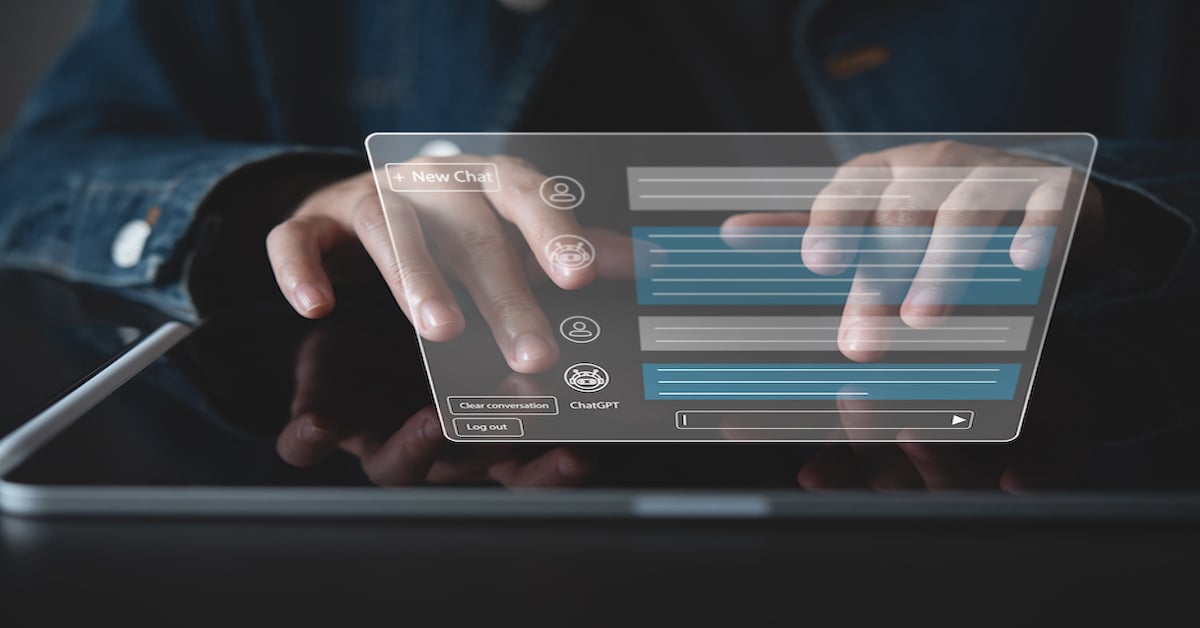How Healthcare Marketers Can Benefit from ChatGPT and AI

Since ChatGPT launched in late 2022, healthcare marketers have increasingly adopted the AI natural language generator to enhance their marketing efforts. With its user-friendly interface and advanced algorithms, ChatGPT can simplify everything from brainstorming to targeting and help you achieve your healthcare marketing goals more productively, creatively, and effectively. But what’s the best way to approach ChatGPT to reap the benefits?
We suggest an attitude of experimentation. Start by learning more about ChatGPT and its advantages and limitations. Build on the ideas below to enhance your healthcare marketing campaigns. Look at best practices for prompts to get the results you want. And finally, remember that the greatest outcomes flow from balancing and blending human expertise and technology.
What is Chat GPT and Generative AI?
Let’s start by deciphering the name ChatGPT. Chat means the AI tool generates text that’s conversational. And GPT refers to the Generative Pre-trained Transformer that applies machine learning to massive amounts of data to develop responses to your prompts.
To use ChatGPT, you provide the prompts and ChatGPT creates sentences or paragraphs that meet your requirements. For example, your prompt may say Use 100 words to explain what cholesterol is, how it contributes to heart disease, and why it’s important for Millennials. Chat GPT will kick back results in seconds—and if they’re not quite what you want, you can fine-tune your prompt. By using past examples, the transformer learns and improves as it goes.
Benefits and Drawbacks of ChatGPT
Like all AI tools, ChatGPT is constantly evolving, a necessity as the field of conversational language generators becomes more crowded with entries like Bard, Jasper, and Rytr. But before using ChatGPT, you should be aware of both its advantages and limitations.
The ChatGPT homepage lists several capabilities that can provide a better experience for you and the audience you’re hoping to reach. The tool remembers what you said earlier in a conversation, lets you follow up your prompts with corrections, and declines inappropriate requests—or at least, that’s what it’s been trained to do.
Here are just a few ways ChatGPT can benefit your healthcare marketing team:
- Get answers fast. Free up time to undertake value-add tasks and enable chatbots to respond to queries with more human and personal language.
- Gain insight into your audiences. Learn more about the pain points, needs and desires, and potential responses of the various audiences you want to target.
- Generate ideas and content quickly. Get input from a variety of sources to inspire your content marketing strategy and creation.
- Analyze and condense data more efficiently. Track social media conversations, understand customer feedback, check reaction to your brand, and identify trends and patterns for your marketing efforts.
Although these benefits are real, don’t lean too heavily on ChatGPT just yet. The ChatGPT homepage also notes several limitations. The tool may occasionally generate incorrect information or even produce harmful instructions or biased content. And it’s a little behind the times—it has limited knowledge of the world and events after 2021.
Given that, here are a few tips to keep in mind:
- Don’t place your full trust in ChatGPT. Despite sounding credible, the tool can put out incorrect or biased information that you should check against authoritative sources.
- Recognize that Information may not be up-to-date. You shouldn’t use ChatGPT as a source for the latest on diseases, conditions, or treatments.
- Fact-check all statements, suspect or not. To make verifying content easier, ask ChatGPT to return citations and references as well as text.
Keep the ChatGPT drawbacks in mind—but don’t let them stop you from pursuing the advantages by giving the tool a try.
How to Get Started Using ChatGPT for Healthcare Marketing
Explore ChatGPT using the six ideas here to see how it works and spark new ways to tackle your marketing to-dos.
Create a content strategy or calendar
To increase traffic and boost engagement with your website or social media posts, prompt ChatGPT to generate content ideas that resonate with target users. You can even request advice on the social media platforms that will net you the most followers. ChatGPT will also review your list of keywords and phrases and suggest some you haven’t considered.
Suggest discussion starters for your blog or social media
Encourage engagement from a specific demographic by asking ChatGPT about their major concerns. For example, when asked for ideas for a healthcare blog targeted for millennials, ChatGPT suggested 10 topics including mental health, impact of technology on healthcare, and benefits of alternative therapies. You can even ask ChatGPT to rename your blog.
Produce initial drafts for every type of asset
Writing even a straightforward blog post on a healthcare topic can require hours of research, fact-checking, writing, and editing. A sensitive email, complex article, or technical brochure may take longer still. Get ChatGPT to do the heavy lifting for you, but don’t expect to cut and paste the results. Instead, it’s best to view the text you receive as a way to kickstart and organize your thinking.
Fine-tune your content
Sometimes even the most creative marketer or writer needs help optimizing for a target audience and editing for maximum clarity and effectiveness. ChatGPT can propose and sharpen headlines and subject lines, rewrite paragraphs in more concise and clear language, and help you polish your arguments. Still, even ChatGPT says AI assistants may not be as creative or imaginative as humans.
Get a quick summary of information
If you need a brief update on a topic—for instance, the ways digital health is advancing health equity for remote and underserved populations—ChatGPT can give you a wrap-up with the length and readability score you specify. ChatGPT can also help identify jargon or technical terms that might trip up your readers and suggest friendlier language.
Make automated responses more human and personal
Although chatbots can be helpful for responding to patient inquiries, they typically have fixed responses and can’t learn and adapt easily. For a more conversational approach, ChatGPT can learn patterns and language structures that enable it to generate more human and engaging answers. By customizing the tool further, ChatGPT can even incorporate information relevant to a patient’s medical history or demographic.
Best Practices for ChatGPT Prompts
To get valuable output from ChatGPT, you need purposeful input. Keep expectations low for results from your initial prompt and don’t plan to stop there. Iterate by changing up your prompt and making it more specific. For example, your prompt can include:
- Context about your product or service
- Information you’d like about a target audience
- Details desired on your audience’s pain points, needs, and desires
- Ideas on the unique value proposition, tone and voice, and channels that would resonate with your audience
- Requests for specific strategies and content—for example, two ways to entice patients to visit a new radiology clinic and catchy headlines that might attract them
The results ChatGPT generates will only be as good as the prompts you insert, so you’ll need to be imaginative and diligent for worthwhile results.
Are AI Tools Here to Stay?
The simple answer: Of course. Most marketers already rely on a range of AI tools. Although ChatGPT may be groundbreaking in terms of generative content, many healthcare marketers use AI tools for data mining, predictive analytics, and personalization.
Human oversight of AI output is critical for the foreseeable future—healthcare marketing teams will still need great marketing strategists, copywriters, and editors. But tools like ChatGPT can give you an edge when you need a fresh idea, another viewpoint, or a jumpstart on your next campaign.
If you’ve got questions or need help leveraging the latest AI tools, we’re here to help. Reach out and connect with our experts.
Related Articles


